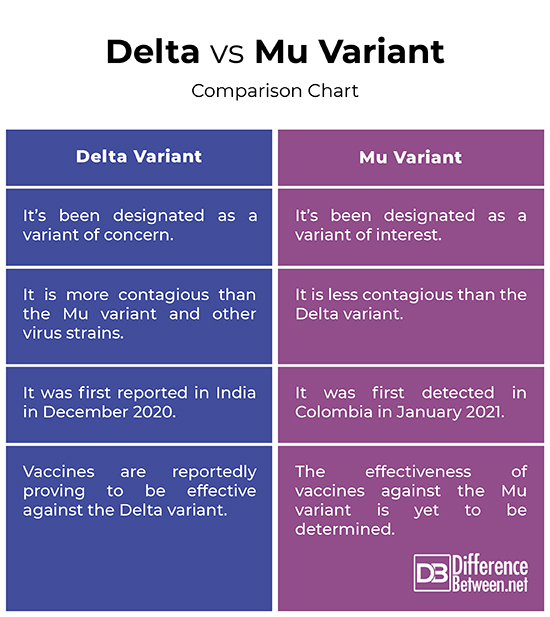Difference Between Delta and Mu Variant
With the growing cases piling up around the world, it is evident that the coronavirus pandemic is far from being completely over. And just when we start to think that it’s coming to an end, some new COVID variants show up on the radar. The coronavirus has changed and changed again. First, the Alpha variant, which was first detected in November 2020 in the United Kingdom, began to spread quickly and the infections spread rapidly. Then, the deadly Delta variant, first reported in India, wreaked havoc further and is still active. And now, a new coronavirus variant named Mu is making headlines. It is pretty clear that it’s a straightforward race with all these viral evolutions like anything else and the one that spreads the fastest will dominate.

What is a Delta Variant?
The Delta variant, also known as lineage B. 1.617.2, was believed to be the primary reason behind the second wave of coronavirus pandemic in India and is currently the predominant strain of the SARS-CoV-2 virus in the United States. The CDC and the WHO have labeled it as a ‘variant of concern,’ a designation previously given to the Alpha variant that first reported in Great Britain and the cases surged rapidly all over the world. The Delta variant is found to be more contagious than the original SARS-CoV-2 virus found in the Hubei Province, China in 2019. The Delta variant was first detected in India as you can recall at one point in India, they were witnessing as many as 400,000 daily caseloads. It has made some inroads very quickly in the last three to four months. In the United Kingdom, more than ninety percent of the cases are the Delta variant.

Then what is a Mu Variant?
The WHO is closely monitoring a new variant of the coronavirus named Mu which, amid growing concerns that it may partially evade resistance to vaccines, is categorized as a ‘variant of interest.’ The Mu variant, also known as B. 1.621, was first detected in Colombia in January 2021 and it’s now been spread across 39 countries as of today. While it accounts for a small portion of the global caseloads, its ability to evade immune protections against vaccines have made it a potential variant of interest. While it’s not as concerning as the Delta or Alpha variants of the coronavirus, which spread so rapidly, it is reportedly found to possess a bunch of mutations that indicate potential properties of immune resistance. The WHO and the health experts are concerned that the Mu variant is slightly more different than other variants and the vaccines may be less effective, which is yet to be discovered.
Difference between Delta and Mu Variant
Classification
– The mutations in viruses can be identified by sequencing followed by laboratory findings and epidemiological investigations. An interagency group of the US government has developed a classification system that defines the three categories of SARS-CoV-2 variants: Variant of Interest, Variant of Concern, and Variant of High Consequence. The Delta variant has been designated by the WHO as the ‘variant of concern’ whereas the new mutation called the Mu variant is categorized as a ‘variant of interest’ by the WHO.
Contagiousness
– The Delta variant, which was first reported in India, was found to be highly contagious than the original SARS-CoV-2 virus first appeared in the Wuhan district of Hubei Province in China. It spread rapidly across the country and Great Britain before reaching the United States, where it is now the predominant variant. With the Mu variant, it doesn’t seem to have taken over in the way the Delta variant spread so rapidly. Currently, Delta is more transmissible than Mu, so Mu probably won’t dominate in the same way, at least not yet.
Delta vs. Mu Variant: Comparison Chart

Summary
If the ongoing coronavirus pandemic has taught us anything; it’s no matter how safe we feel and if we think we got a stable situation, a more transmissible variant comes along and takes it all away. A new variation means the vaccines are less effective and with Mu, there’s a concern that follows is that it is slightly more different than other variants we have witnessed so far. However, the effectiveness of the vaccines against the Mu variant is yet to be seen. As with Delta, it’s already a variant of concern and a predominant strain in the United States.
Is the Delta variant more contagious?
Delta variant is more contagious as it spreads so rapidly and it has been attributed to more severe sickness in several nations. The CDS has labeled it as the ‘variant of concern.
How contagious is the Delta variant?
Data indicates that the Delta variant is 40-60% more transmissible than the Alpha variant and is almost twice as contagious as the original SARS-CoV-2 strain found in the Hubei Province of Wuhan.
What is the new COVID variant named Mu?
The new COVID-19 variant named Mu, also known as B. 1.621, has been designated by the WHO as a variant of interest.
Is Pfizer effective against Delta variant?
Due to limited research, finding the effectiveness of the Pfizer-BioNTech COVID-19 vaccine against the Delta vaccine remains a challenge. However, multiple studies showed promising results. A UK study showed that the vaccine was 33 percent effective after the first dose and 88 percent effective after the second dose at preventing symptomatic infections. Multiple studies suggested different number though.
Do Moderna and Pfizer protect against Delta variant?
Studies suggest both Modern and Pfizer COVID-19 vaccines are effective against the Delta variant to some varying degrees. Due to limited research, the exact effectiveness of the vaccines against the Delta variant is hard to determine.
How effective is Pfizer COVID vaccine?
The Pfizer vaccine was found to be over 95 percent effective against the severe infections or deaths from the Alpha variant and the Beta variant.
- Difference Between Caucus and Primary - June 18, 2024
- Difference Between PPO and POS - May 30, 2024
- Difference Between RFID and NFC - May 28, 2024
Search DifferenceBetween.net :
Leave a Response
References :
[0]MacKenzie, Debora. Stopping the Next Pandemic: How Covid-19 Can Help Us Save Humanity. London, United Kingdom: Hachette UK, 2020. Print
[1]“COVID-19: The Second Wave May Not Be the Last – but Which One Will Be?” The Wire Science, 22 April 2021, https://science.thewire.in/health/covid-19-the-second-wave-may-not-be-the-last-but-which-one-will-be/. Accessed 7 Sept. 2021.
[2]NBC Chicago. “Mu, Delta, Lambda: Here's a Breakdown of COVID Variants and What We Know so Far.” NBC Chicago, NBCUniversal Media, LLC, 2 Sept. 2021, www.nbcchicago.com/news/coronavirus/mu-delta-lambda-heres-a-breakdown-of-covid-variants-and-what-we-know-so-far/2604173/. Accessed 7 Sept. 2021.
[3]Image credit: https://pixabay.com/illustrations/covid-19-coronavirus-delta-variant-6346685/
[4]Image credit: https://i0.wp.com/www.sciencemediacentre.co.nz/wp-content/upload/2021/09/Coronavirus-2.jpg?w=1152&ssl=1
